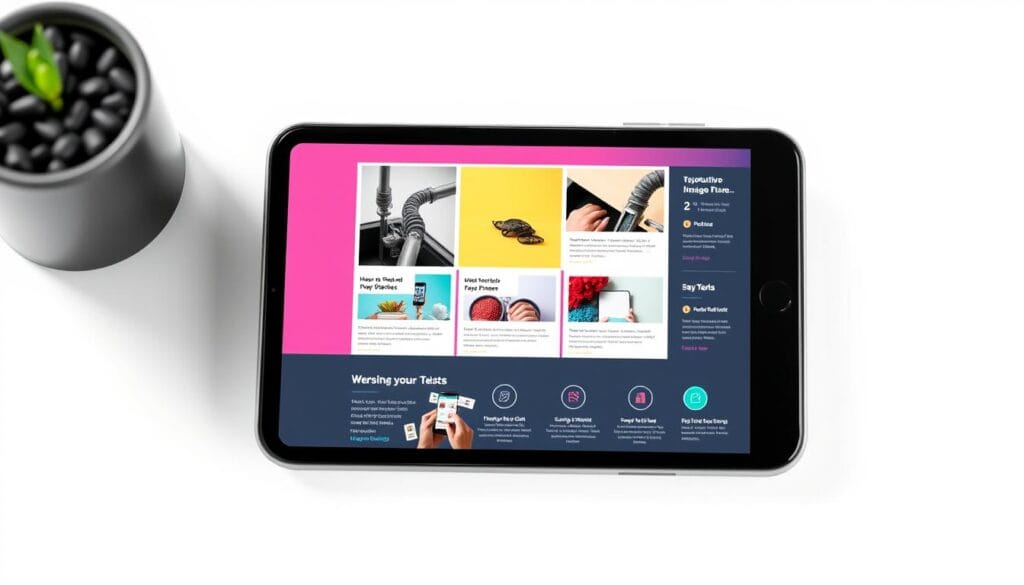How to Build a Business Website – Step by Step Guide

Over 857,000 monthly visitors are drawn to businesses aiming to drive traffic and collect emails. A well-designed website is key for any small business. This guide will help you build a business website, from planning to search engine optimization.
Whether you’re starting up or already established, a modern, easy-to-use website is vital. It helps attract sales. In fact, 30% of people prefer shopping online on a company’s website. With no-code tools, you can create a top-notch website quickly, in just a few days to weeks, depending on your content.
Table of Contents
Planning Your Business Website Strategy
In today’s digital world, over a billion websites vie for attention. Creating a strong website strategy is key for your business’s success. Your website is the heart of your online presence. It helps you connect with your audience, meet marketing goals, and shine among competitors.
Establishing Website Goals and Objectives
The first step is to set clear goals for your website. These might include drawing visitors, creating leads, boosting sales, or showcasing your work. Specific, measurable, and achievable goals guide your website’s design, architecture, and tech decisions.
Identifying Target Audience
Knowing your target audience is vital for a website that speaks to them. Do deep research to find out who your ideal customers are. Learn about their demographics, interests, problems, and online habits. This helps you craft content and user experiences that meet their needs.
Analyzing Competitors
Looking at your competitors’ websites can offer insights for your strategy. Study their design, content, products, and unique selling points. Use this to spot gaps in your market and find ways to make your website stand out.
By planning your website strategy, you set the stage for a site that meets your business goals. It will also connect with your audience and outshine competitors. This strategic planning boosts your online presence and drives success for your business.
“A well-crafted website strategy enhances marketing position, increases ROI, and leads to better cost efficiency.”
Selecting and Registering Your Domain Name
Choosing the right domain name is key to your business website. It’s your digital address, so pick one that’s easy to remember and good for search engines.
When it comes to domain registration, you have many choices. Domain names can cost from free to thousands of dollars a year. Most .com domains are $10–$12, but premium names can be much pricier.
To find the best business domain name, follow these tips:
- Make it short, simple, and easy to remember
- Use keywords that describe your business or industry
- Avoid hyphens, numbers, and hard-to-spell words
- Check if the name is not already trademarked
- Look at different domain extensions like .com, .net, or .org
After picking your domain name, register it. Sites like GoDaddy, NameCheap, and Google Domains make it easy. Don’t forget to think about extra services like domain privacy and email hosting.
Registering your domain name early is smart. The best names get taken fast. With some research and planning, you can get the perfect domain for your business.
| Domain Registrar | Pricing (First Year) | Renewal Pricing | Additional Services |
|---|---|---|---|
| GoDaddy | $11.99 – $20.99 | $17.99 – $29.99 | Domain privacy, email hosting |
| NameCheap | $10.69 – $14.99 | $15.98 – $18.88 | WordPress hosting, SSL, premium DNS |
| Google Domains | $12 – $16 | $12 – $16 | Domain privacy, G Suite integration |
“Investing in a strong domain name can be a game-changer for your business. It’s the first step to building a memorable online presence.”
Choosing the Right Web Hosting Solution
When you’re building a business website, picking the right web hosting is key. Web hosting services give your site the tools it needs to reach visitors. The hosting plan you choose can affect your site’s speed, safety, and how it grows.
Types of Hosting Services
There are many web hosting services to look at, each with its own good and bad points:
- Shared hosting: A cheap choice for small sites with not much traffic. You share server space with others.
- Virtual Private Server (VPS) hosting: Gives you more server space for better site performance and control, great for bigger sites.
- Dedicated hosting: The top choice for high-traffic sites or those needing special features. You get the whole server.
- Cloud hosting: A flexible option that grows with your site, perfect for businesses that are expanding.
Key Hosting Features to Consider
When you’re looking at web hosting providers, think about these important features:
- Uptime guarantee: Aim for at least 99.9% uptime to keep your site up and running.
- Storage and bandwidth: Make sure your hosting plan has enough space and data transfer for your site.
- Security features: Pick a provider that offers SSL certificates, DDoS protection, and regular backups to protect your site.
- Customer support: Good and quick customer support is key for fixing any problems.
Cost and Scalability Factors
Web hosting costs can vary a lot, from $2.59 a month for shared hosting to over $300 for dedicated servers. Think about your current and future needs. Being able to grow or shrink your hosting is important for handling more traffic and business needs.
| Hosting Type | Cost per Month |
|---|---|
| Shared Hosting | $2 – $10 |
| VPS Hosting | $10 – $50 |
| Dedicated Hosting | $80 – $300+ |
| Cloud Hosting | $10 – $30 (scalable) |
By looking at the different hosting services, important features, and costs, you can find a hosting solution that fits your site’s needs and your budget.
How to Build a Business Website
Building a business website can be done in two ways: DIY or by hiring a professional web development team. Your choice depends on your skills, budget, and time.
The DIY website creation option is great for those with little tech knowledge or a small budget. Platforms like Wix, Squarespace, and Dorik offer easy-to-use tools and templates. They help beginners make a professional site without coding. These sites also have features like e-commerce, SEO tools, and mobile-friendly designs.
Professional web development offers a more customized solution. A web development agency or freelancer can make a unique site that fits your brand perfectly. This option costs more but can lead to a more advanced website.
Creating a successful website takes planning, content, and upkeep, no matter the method. Both DIY and professional options need clear goals, knowing your audience, and SEO optimization.
| Website Builder Options | Professional Web Development |
|---|---|
|
|
Choosing between DIY and professional web development depends on your resources and what you want. Think about your options to make sure your website shows off your brand and helps your business grow.

Selecting the Perfect Website Builder Platform
Website builders are now a top choice for creating a professional business website. They offer everything you need to start online quickly. With options like HubSpot, Wix, WordPress.com, and Squarespace, picking the right one can be tough. Knowing what each offers can help you make the best choice for your business.
Popular Website Builder Options
- HubSpot: A comprehensive CMS platform that seamlessly integrates marketing, sales, and customer service tools.
- Wix: Renowned for its intuitive drag-and-drop interface and extensive template library, Wix is a great choice for beginners.
- WordPress.com: The hosted version of the popular open-source CMS, offering a user-friendly experience and a wide range of themes and plugins.
- Squarespace: Known for its visually stunning templates and advanced ecommerce features, Squarespace is a popular choice for creative professionals and small businesses.
- Shopify: A leading ecommerce platform that provides a complete suite of tools for building and managing an online store.
Features and Pricing Comparison
| Platform | Template Variety | Customization Options | Extensions/Plugins | Pricing Range |
|---|---|---|---|---|
| HubSpot | Extensive | Moderate | Vast | $20 – $500/month |
| Wix | Extensive | Extensive | Vast | Free – $500/month |
| WordPress.com | Extensive | Moderate | Vast | Free – $45/month |
| Squarespace | Moderate | Moderate | Moderate | $12 – $40/month |
| Shopify | Moderate | Moderate | Vast | $29 – $299/month |
Ease of Use Considerations
Think about how easy you want the website builder to be. Wix and Squarespace are known for being super easy to use. They have drag-and-drop interfaces that are perfect for beginners. WordPress.com is a bit more complex but still easy to use. The best choice for you will depend on your skills and what you need for your website.
Designing Your Website Layout and Structure
Creating a good website design and architecture is key for better user experience and search engine ranking. A well-planned site structure helps visitors navigate easily through your content.
Begin by using visual sitemap tools to plan your website’s layout. This helps organize your pages and show off your products, services, and brand story. Think about the user’s journey, content amount, and your business goals when making these decisions.
For the visual design, you can pick a pre-made template to save time. But make sure to customize it to fit your brand’s look. Change the colors, images, add social media links, and tweak fonts and buttons for a unified and attractive website design.
It’s also crucial to make your site architecture mobile-friendly. With over 43% of websites on WordPress, Elementor WordPress Hosting offers top uptime and fast loading times. This boosts both user experience and your search engine rankings.
“Good website structure influences user experience and SEO ranking.”
- Outline your site’s information architecture using visual sitemap planning tools.
- Select a pre-made template and customize it to match your brand identity.
- Ensure your website design is responsive and mobile-friendly.
- Consider factors like user journey, content volume, and business goals when planning your site structure.

By putting effort into website design and site architecture, you can build a site that’s easy to use and search-friendly. It will showcase your brand well and attract your target audience.
Creating Essential Website Content and Pages
Making great website content and organizing your pages well is key for your business website’s success. Every part, from the homepage to service and product pages, must work together. They should clearly show your value, engage your audience, and push for sales or contact.
Homepage Optimization
Your homepage is the first thing people see, so it must make a strong impression. Clearly state what your business offers and what makes it special. Also, guide visitors to important actions, like buying or contacting you.
Service and Product Pages
Having separate pages for services or products lets you share detailed info. You can show off their features and how they help. Write engaging, SEO-friendly content that solves your customers’ problems.
Contact Information and Forms
Make it simple for visitors to reach out by showing your contact info clearly. Include your address, phone number, and email. Adding a contact form can also help get leads and talk directly with potential customers.
| Key Website Content Elements | Best Practices |
|---|---|
| Homepage |
|
| Service and Product Pages |
|
| Contact Information and Forms |
|
Your website’s content and layout should aim to be smooth, informative, and focused on sales. This will help your business shine online.
Optimizing Your Website for Search Engines
Getting your website seen by more people is key to growing your business. Search engine optimization (SEO) helps make your site better for search engines. This means your site can show up higher in search results, attracting more visitors.
Using the right keywords is a big part of SEO. Putting these keywords in your content and titles helps people find your site. Also, adding text to your images can help them show up in image searches.
Creating a sitemap is another important step. This XML file helps search engines understand your site better. Getting links from other trusted sites also boosts your site’s standing.
If you have a physical store, local SEO can help a lot. Make sure your Google Business Profile is up to date. Use location-specific keywords to help people find you.
Keeping your site’s content fresh is vital. Search engines like sites that are always updating with new and useful information. This keeps your site relevant and competitive.
By following these SEO tips, you can get more people to visit your site. This can lead to more business and success online. Remember, SEO is an ongoing effort. Always be ready to make changes to keep up with the latest trends.
| SEO Metric | Importance | Recommended Practice |
|---|---|---|
| Keyword Optimization | High | Use relevant keywords in content, meta titles, and descriptions |
| Image Optimization | Moderate | Include descriptive alt text for all images |
| Sitemap Submission | High | Create and submit an XML sitemap to search engines |
| Backlink Building | High | Earn high-quality inbound links from reputable websites |
| Local SEO | High | Optimize for local search by claiming and maintaining a Google Business Profile |
| Content Freshness | High | Regularly update and enhance website content |
“The key to successful SEO is to focus on the user and make your content as useful and compelling as possible.”
Conclusion
Building a business website needs careful planning and ongoing work. Start by setting clear goals and knowing your audience. Pick the right tools and platforms that fit your budget.
Create content that grabs attention and make sure it’s easy to find online. Keep your site updated to meet your business goals. A well-made website can show off your brand, draw in customers, and help your business grow online.
WordPress is a top choice for building websites, used by 43.6% of all sites. It’s easy to use, flexible, and affordable. Hosting services like Bluehost and Hostinger offer great deals with free domains and SSL certificates.
These services make starting your website easy. With WordPress, you can find many plugins and themes to make your site unique and engaging.
Keeping your website up to date is key for success. This includes SEO and fresh content. With the right strategy and tools, you can build a strong online presence. This will help you show off your products, services, and brand to more people.






